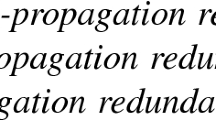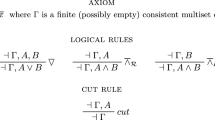Abstract
In this paper we give a new abstract framework for the study of Knuth-Bendix type completion procedures, which are regarded as semidecision procedures for theorem proving.
First, we extend the classical proof orderings approach started in [6] in such a way that proofs of different theorems can also be compared. This is necessary for the application of proof orderings to theorem proving derivations. We use proof orderings to uniformly define all the fundamental concepts in terms of proof reduction.
A completion procedure is given by a set of inference rules and a search plan. The inference rules determine what can be derived from given data. The search plan chooses at each step of the derivation which inference rule to apply to which data. Each inference step either reduces the proof of a theorem or deletes a redundant sentence. Our definition of redundancy is based on the assumed proof ordering. We have shown in [16] that our definition subsume those given in [50, 13].
We prove that if the inference rules are refutationally complete and the search plan is fair, a completion procedure is a semidecision procedure for theorem proving. The key part of this result is the notion of fairness. Our definition of fairness is the first definition of fairness for completion procedures which addresses the theorem proving problem. It is new in three ways: it is target oriented, that is it keeps the theorem to be proved into consideration, it is explicitly stated as a property of the search plan and it is defined in terms of proof reduction, so that expansion inferences and contraction inferences are treated uniformly. According to this definition of fairness, it is not necessary to consider all critical pairs in a derivation for the derivation to be fair. This is because not all critical pairs are necessary to prove a given theorem. Considering all critical pairs is an unnecessary source of inefficiency in a theorem proving derivation.
We also show that the process of diproving inductive theorems by the so called inductionless induction method is a semidecision process. Finally, we present according to our framework, some equational completion procedures based on Unfailing Knuth-Bendix completion.
Research supported in part by grants CCR-8805734, INT-8715231 and CCR-8901322, funded by the National Science Foundation. The first author is also supported by Dottorato di ricerca in Informatica, Universitá degli Studi di Milano, Italy.
Preview
Unable to display preview. Download preview PDF.
Similar content being viewed by others
References
S.Anantharaman and J.Mzali, Unfailing Completion modulo a set of equations, Technical Report, LRI, Université de Paris Sud, 1989.
S. Anantharaman, J. Hsiang and J. Mzali, SbReve2: A Term Rewriting Laboratory with (AC)-Unfailing Completion, in N. Dershowitz (ed.), Proceedings of the Third International Conference on Rewriting Techniques and Applications, Chapel Hill, NC, USA, April 1989, Springer Verlag, Lecture Notes in Computer Science 355, 533–537, 1989.
S. Anantharaman, J. Hsiang, Automated Proofs of the Mougang Identities in Alternative Rings, Journal of Automated Reasoning, Vol. 6, No. 1, 76–109, 1990.
S.Anantharaman, N.Andrianarivelo, Heuristical Criteria in Refutational Theorem Proving, in Proceedings of the Symposium on the Design and Implementation of Systems for Symbolic Computation, 184–193, Capri, Italy, April 1990.
S.Anantharaman, N.Andrianarivelo, M.P.Bonacina, J.Hsiang, SBR3: A Refutational Prover for Equational Theorems, to appear in Proceedings of the Second International Workshop on Conditional and Typed Rewriting Systems, Montreal, Canada, June 1990.
L.Bachmair, N.Dershowitz, J.Hsiang, Orderings for Equational Proofs, in Proceedings of the First Annual IEEE Symposium on Logic in Computer Science, 346–357, Cambridge, MA, June 1986.
L. Bachmair, N. Dershowitz, Completion for rewriting modulo a congruence, in P.Lescanne (ed.), Proceedings of the Second International Conference on Rewriting Techniques and Applications, Bordeaux, France, May 1987, Springer Verlag, Lecture Notes in Computer Science 256, 192–203, 1987.
L.Bachmair, N.Dershowitz, Inference Rules for Rewrite-Based First-Order Theorem Proving, in Proceedings of the Second Annual Symposium on Logic in Computer Science, Ithaca, New York, June 1987.
L. Bachmair, Proofs Methods for Equational Theories, Ph.D. thesis, Department of Computer Science, University of Illinois, Urbana, IL.,1987.
L.Bachmair, Proof by consistency in equational theories, in Proceedings of the Third Annual IEEE Symposium on Logic in Computer Science, 228–233, Edinburgh, Scotland, July 1988.
L. Bachmair, N. Dershowitz and D.A. Plaisted, Completion without failure, in H. Ait-Kaci, M. Nivat (eds.), Resolution of Equations in Algebraic Structures, Vol. II: Rewriting Techniques, 1–30, Academic Press, New York, 1989.
L.Bachmair, H.Ganzinger, On Restrictions of Ordered Paramodulation with Simplification, in Proceedings of the Tenth International Conference on Automated Deduction, Kaiserslautern, Germany, July 1990.
L.Bachmair, H.Ganzinger, Completion of First-Order Clauses with Equality by Strict Superposition, to appear in M.Okada, S.Kaplan (eds.), Proceedings of the Second International Workshop on Conditional and Typed Rewriting Systems, Montreal, Canada, June 1990.
M.P. Bonacina, G. Sanna, K Blab: An Equational Theorem Prover for the Macintosh, in N.Dershowitz (ed.), Proceedings of the Third International Conference on Rewriting Techniques and Applications, Chapel Hill, NC, USA, April 1989, Springer Verlag, Lecture Notes in Computer Science 355, 548–550, 1989.
M.P.Bonacina, J.Hsiang, Operational and Denotational Semantics of Rewrite Programs, to appear in Proceedings of the North American Conference on Logic Programming, Austin, TX, October 1990.
M.P.Bonacina, J.Hsiang, On fairness of completion-based theorem proving strategies, Technical report, Department of Computer Science, SUNY at Stony Brook.
M.P.Bonacina, J.Hsiang, The Knuth-Bendix-Huet theorem and its extensions, in preparation.
C.L. Chang, R.C. Lee, Symbolic Logic and Mechanical Theorem Proving, Academic Press, New York, 1973.
N. Dershowitz, Z. Manna, Proving termination with multisets orderings, Communications of the ACM, Vol. 22, No. 8, 465–476, August 1979.
N.Dershowitz, N.A.Josephson, Logic Programming by Completion, in Proceedings of the Second International Conference on Logic Programming, 313–320, Uppsala, Sweden, 1984.
N. Dershowitz, Computing with Rewrite Systems, Information and Control, Vol. 65, 122–157, 1985.
N.Dershowitz, D.A.Plaisted, Logic Programming Cum Applicative Programming, in Proceedings of the IEEE Symposium on Logic Programming, 54–66, Boston, MA, 1985.
N. Dershowitz, Termination of Rewriting, Journal of Symbolic Computation, Vol. 3, No. 1 & 2, 69–116, February/April 1987.
N.Dershowitz, Completion and its Applications, in Proceedings of Conference on Resolution of Equations in Algebraic Structures, Lakeway, Texas, May 1987.
N.Dershowitz, J.-P.Jouannaud, Rewrite Systems, Technical Report 478, LRI, Université de Paris Sud, April 1989 and Chapter 15 of Volume B of Handbook of Theoretical Computer Science, North-Holland, 1989.
N.Dershowitz, J.-P.Jouannaud, Notations for Rewriting, Rapport de Recherche 478, LRI, Université de Paris Sud, January 1990.
N.Dershowitz, A Maximal-Literal Unit Strategy for Horn Clauses, to appear in M.Okada, S.Kaplan (eds.), Proceedings of the Second International Workshop on Conditional and Typed Rewriting Systems, Montreal, Canada, June 1990.
F.Fages, Associative-commutative unification, in R.Shostak (ed.), Proceedings of the Seventh International Conference on Automated Deduction, Napa Valley, CA, USA, 1984, Springer Verlag, Lecture Notes in Computer Science 170, 1984.
L.Fribourg, A Strong Restriction to the Inductive Completion Procedure, in Proceedins of the Thirteenth International Conference on Automata Languages and Programming, Rennes, France, July 1986, Springer Verlag, Lecture Notes in Computer Science 226, 1986.
J.A.Goguen, How to prove algebraic inductive hypotheses without induction, in W.Bibel and R.Kowalski (eds.), Proceedings of the Fifth International Conference on Automated Deduction, 356–373, Les Arcs, France, 1980, Springer Verlag, Lecture Notes in Computer Science 87, 1980.
J.Hsiang, N.Dershowitz, Rewrite Methods for Clausal and Nonclausal Theorem Proving, in Proceedings of the Tenth International Conference on Automata, Languages and Programming, Barcelona, Spain, July 1983, Springer Verlag, Lecture Notes in Computer Science 154, 1983.
J. Hsiang, Refutational Theorem Proving Using Term Rewriting Systems, Artificial Intelligence, Vol. 25, 255–300, 1985.
J. Hsiang, M. Rusinowitch, A New Method for Establishing Refutational Completeness in Theorem Proving, in J.Siekmann (ed.), Proceedings of the Eighth Conference on Automated Deduction, Oxford, England, July 1986, Springer Verlag, Lecture Notes in Computer Science 230, 141–152, 1986.
J. Hsiang, Rewrite Method for Theorem Proving in First Order Theories with Equality, Journal of Symbolic Computation, Vol. 3, 133–151, 1987.
J. Hsiang, M. Rusinowitch, On word problems in equational theories, in Th.Ottman (ed.), Proceedings of the Fourteenth International Conference on Automata, Languages and Programming, Karlsruhe, West Germany, July 1987, Springer Verlag, Lecture Notes in Computer Science 267, 54–71, 1987.
J.Hsiang, M.Rusinowitch and K. Sakai, Complete Inference Rules for the Cancellation Laws, in Proceedings of the Tenth International Joint Conference on Artificial Intelligence, Milano, Italy, August 1987, 990–992, 1987.
J.Hsiang, M.Rusinowitch, Proving Refutational Completeness of Theorem Proving Strategies: the Transfinite Semantic Tree Method, to appear in Journal of the ACM, 1990.
G. Huet, Confluent reductions: abstract properties and applications to term rewriting systems, Journal of the ACM, Vol. 27, 797–821, 1980.
G. Huet, A Complete Proof of Correctness of the Knuth-Bendix Completion Algorithm, Journal of Computer and System Sciences, Vol. 23, 11–21, 1981.
G. Huet, J.M. Hullot, Proofs by Induction in Equational Theories with Constructors, Journal of Computer and System Sciences, Vol. 25, 239–266, 1982.
J.-P. Jouannaud, C. Kirchner, Completion of a set of rules modulo a set of equations, SIAM Journal of Computing, Vol. 15, 1155–1194, November 1986.
J.-P.Jouannaud, E.Kounalis, Proofs by induction in equational theories without constructors, in Proceedings of the First Annual IEEE Symposium on Logic in Computer Science, 358–366, Cambridge, MA, June 1986.
J.-P.Jouannaud, E.Kounalis, Automatic proofs by induction in equational theories without constructors, Information and Computation, 1989.
J.-P.Jouannaud, C.Kirchner, Solving Equations in Abstract Algebras: A Rule-Based Survey of Unification, Rapport de Recherche, LRI, Université de Paris Sud, November 1989.
S. Kamin, J.-J. Lévy, Two generalizations of the recursive path ordering, Unpublished note, Department of Computer Science, University of Illinois, Urbana, Illinois, February 1980.
D.Kapur and P.Narendran, An equational approach to theorem proving in first order predicate calculus, in Proceedings of the Ninth International Joint Conference on Artificial Intelligence, 1146–1153, Los Angeles, CA, August 1985.
D. Kapur and D.R. Musser, Proof by consistency, Artificial Intelligence, Vol. 31, No. 2, 125–157, February 1987.
D. Kapur, P. Narendran and H. Zhang, Proof by induction using test sets, in J.Siekmann (ed.), Proceedings of the Eighth Conference on Automated Deduction, Oxford, England, July 1986, Springer Verlag, Lecture Notes in Computer Science 230, 99–117, 1986.
D.E. Knuth, P. Bendix, Simple Word Problems in Universal Algebras, in J. Leech (ed.), Proceedings of the Conference on Computational Problems in Abstract Algebras, Oxford, England, 1967, Pergamon Press, Oxford, 263–298, 1970.
E.Kounalis, M.Rusinowitch, On Word Problems in Horn Theories, in E.Lusk, R.Overbeek (eds.), Proceedings of the Ninth International Conference on Automated Deduction, 527–537, Argonne, Illinois, May 1988, Springer Verlag, Lecture Notes in Computer Science 310, 1988.
D.S. Lankford, Canonical inference, Memo ATP-32, Automatic Theorem Proving Project, University of Texas, Austin, TX, May 1975.
D.S. Lankford, A simple explanation of inductionless induction, Technical report MTP-14, Mathematics Department, Louisiana Technical University, Ruston, LA, 1981.
D.Musser, On proving inductive properties of abstract data types, in Proceedings of the Seventh ACM Symposium on Principles of Programming Languages, 154–162, Las Vegas, Nevada, 1980.
G.E. Peterson, M.E. Stickel, Complete sets of reductions for some equational theories, Journal of the ACM, Vol. 28, No. 2, 233–264, 1981.
G.E. Peterson, A Technique for Establishing Completeness Results in Theorem proving with Equality, SIAM Journal of Computing, Vol. 12, No. 1, 82–100, 1983.
D.A. Plaisted, Semantic confluence tests and completion methods, Information and Control, Vol. 65, 182–215, 1985.
M.Rusinowitch, Theorem-proving with resolution and superposition: an extension of Knuth and Bendix procedure as a complete set of inference rules, Thèse d'Etat, Université de Nancy, 1987.
M.E.Stickel, Unification Algorithms for Artificial Intelligence Languages, Ph.D. thesis, Carnegie Mellon University 1976.
M.E. Stickel, A unification algorithm for associative-commutative functions, Journal of the ACM, Vol. 28, No. 3, 423–434, 1981.
H.Zhang, D.Kapur, First Order Theorem Proving Using Conditional Rewrite RUles, in E.Lusk, R.Overbeek (eds.), Proceedings of the Ninth International Conference on Automated Deduction, 1–20, Argonne, Illinois, May 1988, Springer Verlag, Lecture Notes in Computer Science 310, 1988.
Author information
Authors and Affiliations
Editor information
Rights and permissions
Copyright information
© 1991 Springer-Verlag Berlin Heidelberg
About this paper
Cite this paper
Bonacina, M.P., Hsiang, J. (1991). Completion procedures as semidecision procedures. In: Kaplan, S., Okada, M. (eds) Conditional and Typed Rewriting Systems. CTRS 1990. Lecture Notes in Computer Science, vol 516. Springer, Berlin, Heidelberg. https://doi.org/10.1007/3-540-54317-1_92
Download citation
DOI: https://doi.org/10.1007/3-540-54317-1_92
Published:
Publisher Name: Springer, Berlin, Heidelberg
Print ISBN: 978-3-540-54317-6
Online ISBN: 978-3-540-47558-3
eBook Packages: Springer Book Archive




